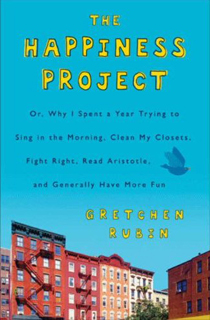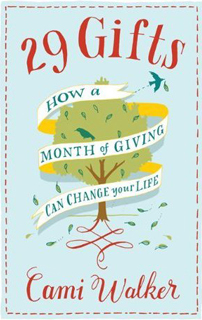The Happiness Project
Permanent linkHow listening to Bon Jovi, watching a Billy Crystal flick, and giving away a prom dress can make you happier

The prom dress
Last year, I won a dress in a raffle. The gown happened to be designed by my favorite designer, one that I don’t typically buy from because… well…her clothing costs almost as much as my monthly rent. As I approached the auctioneer to claim my winnings, I contemplated the perfect occasion to wear the dress. But as I looked at my prize up close, I saw the dress wasn’t my size. So I tucked it away in my closet and let it gather dust.
Many months later, this spring, I volunteered at the Glass Slipper Project, a charity that donates dresses to underprivileged girls to wear to their prom. Volunteers are matched with the teens, acting as their personal shoppers to help them find dresses and accessories for their big night out.
And there it was—while volunteering, I had finally found the perfect occasion for the dress.
I saw one of the young women grab my dress from the rack, try it on, and take it home. Envisioning that girl feel like a princess on her prom night brought tears to my eyes. Knowing she would wear the dress made me so much happier than wearing it myself ever could.
‘The Happiness Project’
The happiness I felt for that young woman got me thinking about what makes people happy. And really, what’s more important to think about? I scoured the Borders bookshelves and found dozens of titles on the subject—apparently I’m not the only one with happiness on my mind.
During my research, I read two books. “The Happiness Project,” (HarperCollins Publishers) by Gretchen Rubin, is about a Manhattan lawyer, wife, and mother of two young girls, who sets out on a quest to make her life the happiest it could be by making small changes—singing in the morning, cleaning her closets, and spending more time with her family.

Then, I read “29 Gifts,” (Da Capo Press) by Cami Walker, the true story of a 33-year-old newlywed woman, diagnosed with multiple sclerosis, who was feeling really sorry for herself. A medicine woman recommends that Walker give away 29 gifts in 29 days as a way to get outside of her own headspace. “By giving,” the woman tells her, “you are focusing on what you have to offer others, inviting more abundance into your life.”

Both books argue that performing acts of kindness not only brings happiness to others, but raises your own sense of happiness too. In one study, psychologist Sonja Lyubomirsky researches different sources of happiness. One of the best, according to the psychologist, is performing acts of altruism or kindness, such as visiting a nursing home, helping a child with homework, or mowing a neighbor’s lawn. Doing five acts a week, especially all in a single day, substantially boosted the happiness of the subjects in Lyubomirsky’s study.
Committing deeds of loving kindness, gemilut hasadim, is central to Judaism. The Talmud teaches that giving to others brings us closer to God (Sotah 14a): “…We should follow the attributes of the Holy One of Blessing. As God clothes the naked, you should clothe the naked. The Bible teaches that the Holy One visited the sick; you should visit the sick. The Holy One comforted those who mourned; you should comfort those who mourn. The Holy One buried the dead; you should bury the dead. Rabbi Simlai taught: The Torah begins with deeds of kindness (gemilut hasadim) and ends with deeds of kindness.’”
Kindness boosts the happiness of both the recipient and the giver and, as a result, happiness circulates in the world. This concept is what Kabbalah (Jewish mysticism) teaches us. We are taught to repair the broken world, and that everything we do, good or bad, large or small, affects the balance of the universe. Take the story of the prom dress. I was happy for the young woman who chose my dress. I just know she felt happy wearing it on her prom night, and perhaps she’ll pay the favor forward some day by giving back. Maybe she too will volunteer for the Glass Slipper Project one day, having had such a positive experience as a recipient. One good deed will circulate a lot of happiness in the world.
My guide to happiness
In “The Happiness Project,” Rubin identifies 12 ways she has achieved greater happiness. Here are a dozen of the ways I find happiness in my life. I hope they’ll make you happier too.
1) This summer, walk, jog, bike, or swim by the lake: For one thing, exercise releases endorphins in the brain, which help boost your happiness. Plus, whether you’re in a good mood or a bad one, looking out at the water makes you realize how small we all are compared to a great big world.
2) Look up at the sky: Sunsets, the skyline, the stars, clouds shaped like animals…There’s a lot of cool stuff up there.
3) Listen to cheesy 80s music: A few recommendations from my iPod playlist are Journey’s “Don’t Stop Believin’” Bon Jovi’s “Livin’ on a Prayer,” and anything Madonna.
4) Call your grandparents often: They’ve led fascinating lives and they’re smarter than you.
5) Just give: No matter what you give—a meal, a dollar, a smile, your time—there’s someone out there who needs it more than you.
6) Watch “When Harry Met Sally:” It’s just the best movie ever. And that line—when Harry tells Sally that “when you realize you want to spend the rest of your life with somebody, you want the rest of your life to start as soon as possible”—is just the best line ever.
7) Spend time with people who really get you: Whether they’re significant others, family, or friends, hang out with the people you really like and spend less time with the people you don’t.
8) Eat S’mores: It’s an unscientifically proven fact that no one has ever been unhappy while eating S’mores. Bonus points if you can eat `em over a campfire, but a microwave works too.
9) Tuck in a kid: From time to time, I get the joy of tucking my 2- and 5-year-old nephews in for the night. We read together (usually the same book 4 times in one evening) and we recap the adventures of their day (they have this way of making mundane activities seem fun and extraordinary). Find a kid, either your own or someone else’s, to tuck in.
10) Share Shabbat with people you care about: Even if you’re not religious, Shabbat is a nice time to set apart from the rest of the week to reflect and enjoy.
11) Laugh more: According to “The Happiness Project,” a small child typically laughs more than 400 times each day, while an adult laughs only 17 times. Raise that average.
12) Spend money on airline tickets to visit people you love: It’s worth the money.
Oy! wants to read your guide to happiness—Tell us what makes you smile by posting in the comments section below:



.jpg)



